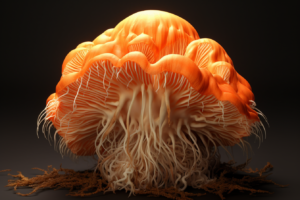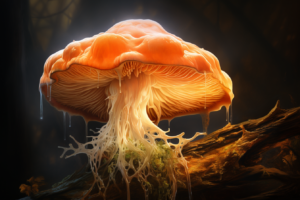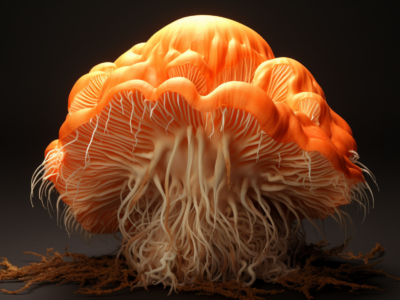Anxiety is a common and often debilitating mental health disorder that affects millions of people worldwide. While there are many conventional treatments for anxiety, several natural alternatives have emerged in recent years – including Lion’s Mane mushroom. This article will explore the relationship between Lion’s Mane and anxiety, discussing what research says about its efficacy as a potential treatment option. We’ll delve into the nutritional components of this fascinating fungus and investigate how it may support cognitive function while easing symptoms associated with anxiety disorders. So if you’re looking for information on alternative remedies to combat your anxiety, stick around!
What is Lion’s Mane Mushroom?
Lion’s Mane mushroom, also known as Hericium erinaceus, is a type of medicinal mushroom that has been used for centuries throughout Asia for its potential health benefits. Its characteristic appearance resembles a lion’s mane and it can be found growing on trees in North America, Europe and Asia. This fungus contains various bioactive compounds including polysaccharides, beta-glucans, hericenones and erinacines.
 Recent research indicates that Lion’s Mane mushroom may offer several therapeutic effects such as improved cognitive function, reduced inflammation and neuroprotective properties. Additionally, this mushroom has shown promise in alleviating anxiety symptoms by promoting the synthesis of nerve-growth factors which play a crucial role in brain health.
Recent research indicates that Lion’s Mane mushroom may offer several therapeutic effects such as improved cognitive function, reduced inflammation and neuroprotective properties. Additionally, this mushroom has shown promise in alleviating anxiety symptoms by promoting the synthesis of nerve-growth factors which play a crucial role in brain health.
Due to its unique nutritional profile, Lion’s Mane has become an increasing topic of interest among natural medicine practitioners who are exploring the potential usage of this fungus as a complementary therapy to conventional treatment options for anxiety disorders.
Understanding Anxiety: Causes and Symptoms
Anxiety is a psychological condition characterized by feelings of worry, fear, and nervousness. It can result from various factors such as genetics, environmental stressors, or trauma. Symptoms of anxiety may include sweating, rapid heartbeat, panic attacks, and difficulty sleeping. These symptoms can significantly impact an individual’s ability to function in daily life.
Lion’s Mane mushroom has gained attention in recent years for its potential cognitive and mental health benefits. Research suggests that Lion’s Mane contains compounds that may support the growth of nerve cells in the brain and reduce inflammation – both areas where anxiety disorders have been linked to malfunctioning activity. While more studies are needed to fully understand the relationship between Lion’s Mane and anxiety relief, emerging research provides hope for natural alternatives to traditional treatments.
The Science Behind Lion’s Mane and Anxiety
Lion’s Mane mushroom (Hericium erinaceus) has received attention as a potential natural remedy for anxiety due to its reported cognitive and neuroprotective effects. Research has shown that Lion’s Mane contains polysaccharides, which have neuroregenerative properties and may support the growth of new brain cells. The mushroom also contains compounds such as hericenones and erinacines, which are known to stimulate nerve growth factor (NGF) – a protein essential for the development and maintenance of neurons in the brain.
Studies conducted on animal models suggest that Lion’s Mane could improve symptoms related to anxiety by reducing levels of cortisol – a stress hormone produced by our body during periods of high emotional or physical stress. In one study involving mice, researchers found that Hericium erinaceus extract significantly decreased their anxiety-like behaviors by lowering cortisol levels and increasing dopamine activity in their brains.
While further research is needed to determine the effectiveness of Lion’s Mane as an alternative treatment for anxiety disorders in humans, preliminary studies indicate promising results regarding its potential therapeutic benefits. As with any form of medicine or supplement, it is important to consult with a healthcare professional before taking Lion’s Mane or any other herbal remedies.
Lion’s Mane and Brain Function: How it Works
Lion’s Mane mushroom, also known as Hericium erinaceus, is a popular natural supplement that has been historically used for medicinal purposes. Recent research suggests that Lion’s Mane may improve brain function and alleviate symptoms associated with anxiety disorders. This fascinating fungus contains several compounds like erinacines and hericenones, which are believed to stimulate nerve growth factor (NGF) production in the brain and nervous system.
 By increasing NGF levels in the body, Lion’s Mane helps support cognitive function by promoting healthy neuron development and improving overall neural efficiency.
By increasing NGF levels in the body, Lion’s Mane helps support cognitive function by promoting healthy neuron development and improving overall neural efficiency.
Moreover, Lion’s Mane has been found to help regulate stress hormones like cortisol that can cause anxiety when produced at high levels.
In one small study on humans with depression and anxiety disorder, participants who were administered 250 milligrams of Lion’s Mane thrice daily showed a reduction in their self-reported symptoms compared to those who did not receive any treatment. While more studies are needed to define the full extent of its efficacy against these conditions; early findings indicate promising potential for this powerful alternative remedy.
Research Studies on Lion’s Mane and Anxiety
Several research studies have investigated the potential benefits of Lion’s Mane mushroom as a natural treatment for anxiety. One study published in the Journal of Dietary Supplements found that participants who consumed Lion’s Mane extract experienced significant reductions in feelings of confusion and tension compared to those taking a placebo. Another study from the International Journal of Medicinal Mushrooms reported similar results, with individuals reporting reduced symptoms of anxiety after taking Lion’s Mane supplement.
These findings suggest that Lion’s Mane may have anxiolytic properties, potentially due to its ability to support cognitive function and decrease inflammation in the brain. Additionally, several compounds found within this mushroom – such as hericenones and erinacines – are believed to promote neural growth and increases production of nerve growth factor (NGF) which is linked with improved mood regulation and emotional balance.
While more research is needed on how specifically lion’s mane helps combat anxiety disorders, these initial studies provide promising evidence for further investigation into this natural alternative treatment option.
Using Lion’s Mane Mushroom to Treat Anxiety
Lion’s Mane mushroom is a unique fungus that has been used in traditional Chinese medicine for centuries. Recently, it has gained popularity as a natural option for treating anxiety. Research suggests that Lion’s Mane may reduce symptoms of anxiety by helping to regulate the release of neurotransmitters such as serotonin and dopamine, which play a critical role in mood regulation.
In addition to its potential therapeutic benefits, Lion’s Mane is also rich in antioxidants and anti-inflammatory compounds that support overall brain health. This includes improving cognitive function by promoting nerve growth and enhancing memory and learning abilities. Given these properties, Lion’s Mane may be particularly beneficial for those with anxiety disorders who have experienced cognitive impairment or difficulty concentrating as part of their symptoms. However, more research is needed to fully understand its potential applications as an anxiety treatment option.
Potential Side Effects and Precautions of Lion’s Mane Mushroom
While Lion’s Mane mushroom has been touted as a natural remedy for anxiety and other mental health issues, it is important to note that there are potential side effects and precautions to consider. Some individuals may experience allergic reactions or digestive discomfort when consuming Lion’s Mane, although these side effects are generally mild in nature.
Moreover, those taking blood-thinning medications should exercise caution when using this supplement as it can potentially increase the risk of bleeding. Additionally, more research is needed to fully understand how Lion’s Mane may interact with other medication regimens or medical conditions – so users should consult with their doctor before adding this supplement into their routine.
Overall, while Lion’s Mane may offer some promising benefits for those struggling with anxiety or cognitive challenges, users should be aware of its potential risks and take necessary precautions before incorporating it into their wellness regimen.

In Closing:
Lion’s Mane, a medicinal mushroom, may offer holistic help with anxiety, according to many anecdotal reports. Evidence suggests that Lion’s Mane may help reduce symptoms of anxiety and depression. This mushroom supplement, often consumed as a powder or extract, appears to have anxiolytic effects. It has the potential to reduce anxiety levels, offering a natural approach to anxiety management.
Interestingly, there are even reports of individuals consuming Lion’s Mane cookies to avail its medicinal benefits, including its impact on anxiety symptoms. While these effects after taking Lion’s Mane for anxiety are largely anecdotal, some studies have found promising results.
Compounds in Lion’s Mane, like hericenones and erinacines, support brain health and promote the growth of neurons. This can have a direct effect on emotional responses and stress, which are commonly associated with anxiety. The mushroom does not contain selective serotonin reuptake inhibitors (SSRIs), but it may function similarly by helping identify and change negative thought patterns, a characteristic feature of many types of anxiety disorders.
Furthermore, Lion’s Mane may improve sleep quality, a health condition often compromised in individuals with anxiety. Some evidence suggests that Lion’s Mane can also positively influence gut health, further supporting mental well-being as gut health and anxiety are closely linked.
Remember, while Lion’s Mane may help, anxiety often requires a comprehensive treatment approach. If you’re interested in trying Lion’s Mane for anxiety, it’s recommended to consult a healthcare professional for advice on dosage and potential interactions.
FAQ:
Q: What is Lion’s Mane and how does it help with anxiety?
A: Lion’s Mane is a type of mushroom supplement that has become increasingly popular in recent years due to its potential to reduce anxiety and depression symptoms. It is considered a holistic approach to anxiety relief that may also improve sleep quality and gut health.
Q: Can Lion’s Mane help with stress and anxiety?
A: While anecdotal reports suggest that Lion’s Mane may help with anxiety, there is limited scientific evidence to support its use as an anti-anxiety or antidepressant medication. However, some studies have shown that it has the potential to reduce anxiety levels in certain individuals.
Q: What are the potential effects of Lion’s Mane on anxiety symptoms?
A: The medicinal benefits of Lion’s Mane are still being researched, but evidence suggests that it may have properties that help alleviate symptoms of anxiety and depression. Some individuals report feeling more calm and relaxed after taking Lion’s Mane, while others have experienced improvements in emotional responses.
Q: How much Lion’s Mane should I take for anxiety relief?
A: The recommended dosage of Lion’s Mane varies depending on your health condition and the form in which you are taking it. Many supplements recommend taking anywhere from 500 to 1500mg daily for at least 4 weeks to see potential effects on anxiety symptoms. Always consult with your healthcare provider before starting a new supplement regimen.
Q: Are there any side effects of taking Lion’s Mane for anxiety?
A: Lion’s Mane is generally considered safe for most individuals, but some may experience mild side effects such as digestive discomfort or headaches. It is important to note that Lion’s Mane does not contain any psychoactive compounds and should not produce any psychoactive effects typically associated with anxiety.
Q: What types of anxiety disorders can Lion’s Mane help with?
A: Lion’s Mane is not a cure for anxiety disorders and should not be used as a replacement for professional anxiety management. However, some individuals have found that Lion’s Mane helps to reduce symptoms associated with commonly associated with anxiety such as nervousness, restlessness, and irritability.
Q: Can I incorporate Lion’s Mane into my diet as a food?
A: Yes, Lion’s Mane can be consumed as a food in various forms such as teas, capsules, or even baked into mane cookies. Adding Lion’s Mane to your diet may provide additional benefits beyond anxiety relief, such as improving cognitive function and strengthening the immune system.
Q: Can Lion’s Mane help with reducing symptoms of depression?
A: Some studies suggest that Lion’s Mane may have potential to improve symptoms of depression, as it may increase levels of certain neurotransmitters associated with mood regulation such as serotonin and dopamine. However, more research is needed to fully understand its effects on depression.
Q: Can Lion’s Mane be used as a standalone treatment for anxiety?
A: Lion’s Mane should not be used as a standalone treatment for anxiety and should always be used in conjunction with proper anxiety management techniques and/or therapy. It is important to treat anxiety with a holistic approach, addressing both the physiological and psychological aspects of the disorder.
Q: How long does it take for Lion’s Mane to take effect on anxiety?
A: The effects of Lion’s Mane on anxiety may vary from person to person, but many suggest taking it for at least 4 weeks before expecting to see any noticeable changes in anxiety symptoms. However, it is important to consult with your healthcare provider before beginning any new supplement regimen.



 Lion’s Mane and Depression: Mane Mushroom for Depression
Lion’s Mane and Depression: Mane Mushroom for Depression
